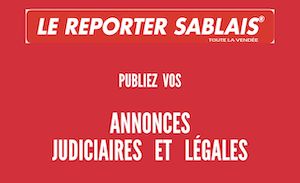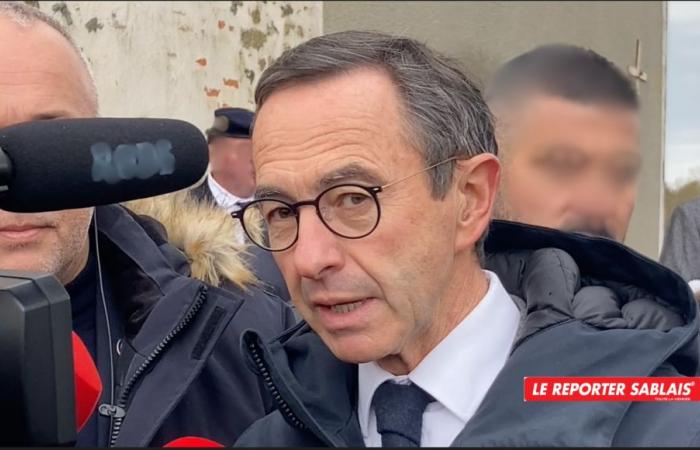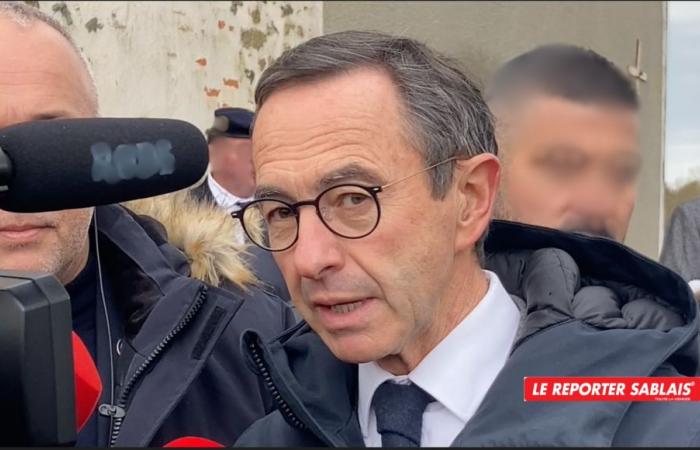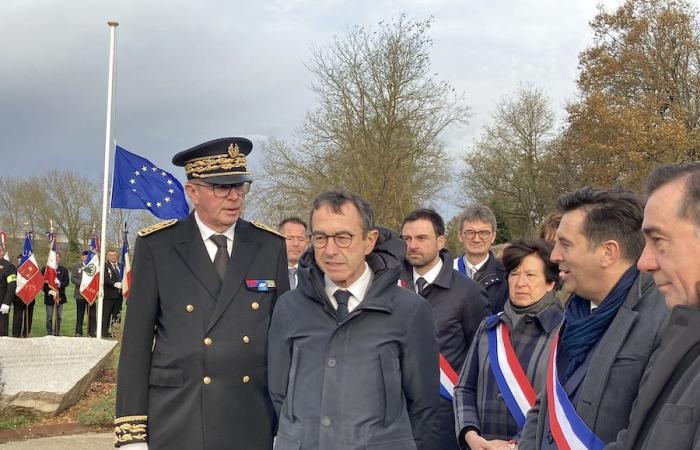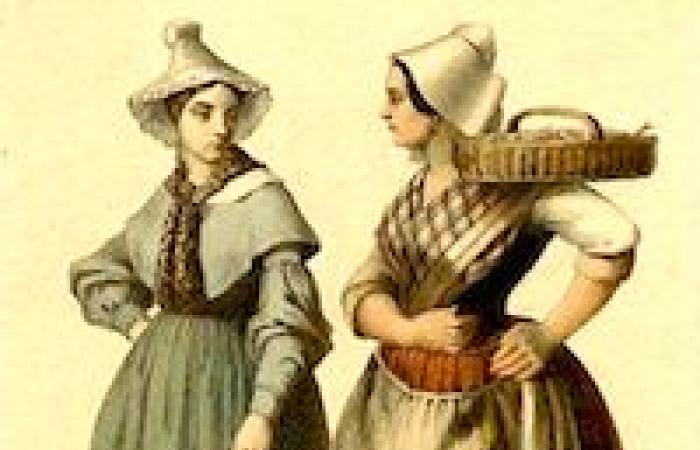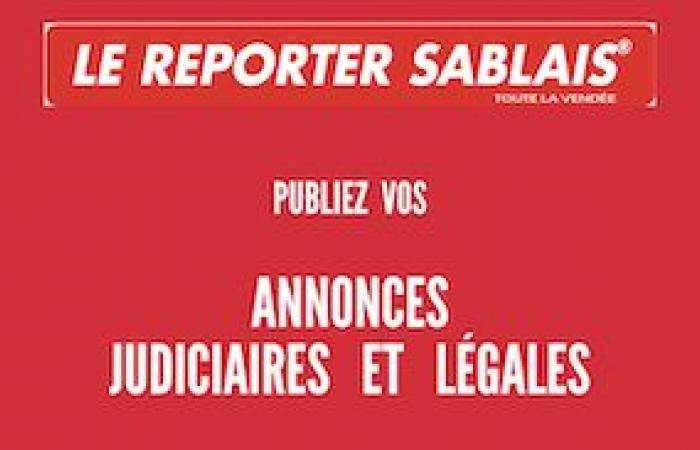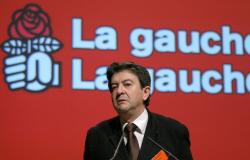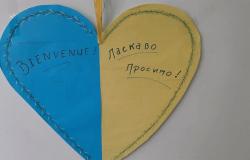Publish your legal notices in Vendée:
https://www.lereportersablais.com/annoncesjudiciairesetlegales/
Vendée Mouchamps. Bruno RETAILLEAU “I don’t compare myself to Georges Clemenceau!”
On the occasion of the 95th anniversary of his death, the Minister of the Interior Bruno Retailleau paid tribute to him in Mouchamps (Vendée) where he is buried.
The Prefect Gérard Gavory, Vendée parliamentarians – Véronique Besse, Pierre Henriet, Didier Mandelli (vice-president of the senate) – the president of the department Alain Leboeuf, and many authorities were present.
In a speech lasting around ten minutes, the minister returned to the personality of Georges Clemenceau, the “Father Victory”; whose repartee and eloquence were renowned.
Shortly after, speaking to the press, he expressed indignation at the rise in cases of racism in France, particularly towards the Jewish community.
Then, about Georges Clemenceau, he declared:
” Georges Clemenceau, who is a great Vendéen, who was a great Frenchman: he had this phrase which must speak to all Vendéens, which speaks to me since he was Minister of the Interior, I am Minister of the Interior, but I don't compare me to Georges Clemenceau; this sentence that he often uttered is the following:
– It is to the Vendée temperament that I owe the best of my qualities“.
Certainly knowing that some called him “1st cop of France”, alluded to the “Tiger Brigades”, to their joint operation for the Vendée, to their roots etc… Bruno Recalleau did not fail to specify to the Press that he did not compare himself to Georges Clemenceau!
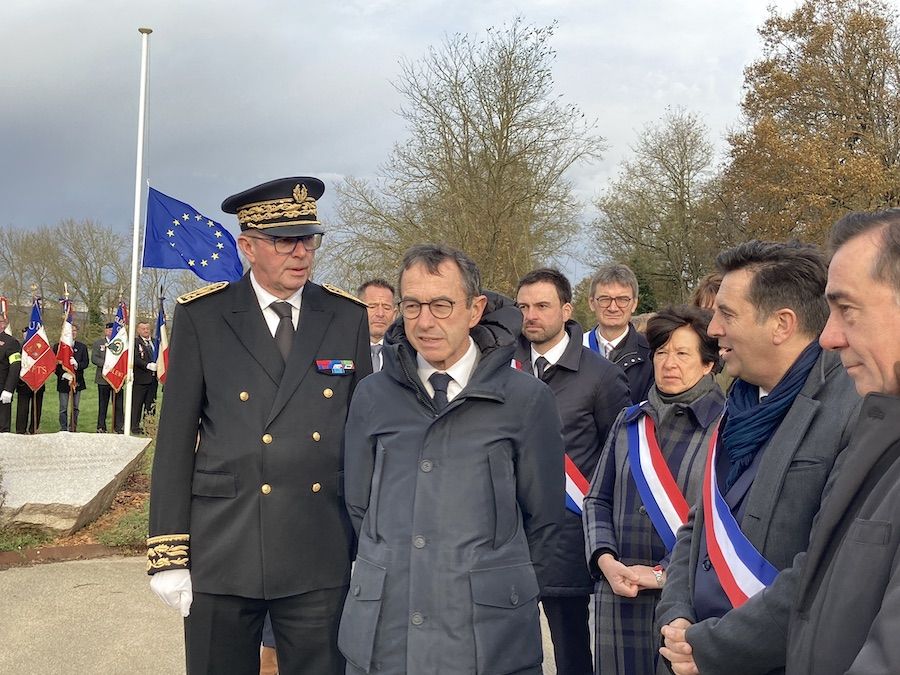

The Prefect Gérard Gavory, the Minister of the Interior Bruno Retailleau, the purified Véronique Besse, the mayor of Mouchamps, Patrick Mandin, and the president of the Departmental Council Alain Leboeuf.
Video
(other videos of the ceremony, in progress)
Speech by Bruno Retailleau, Minister of the Interior,
on the occasion of the 9th anniversary of the death of Georges Clemenceau
“Mr Prefect,
Ladies and Gentlemen Parliamentarians, dear Véronique, dear Pierre, dear Didier – first vice-president of the Senate -,
Ladies and gentlemen elected officials,
Mr President of the Departmental Council, dear Alain, Madam representative of the Regional Council, dear Anne-Sophie,
Ladies and gentlemen mayors, and particularly the mayors of Clemency municipalities,
And of course Mr. Mayor of Mouchamps, dear Patrick,
Mr. President of UNC Vendée to whom I want to send a message of gratitude this morning with all these standard bearers,
Ladies and gentlemen, police, firefighters, ladies and gentlemen, representatives of the fighting world,
« Here is the promise fulfilled on your Vendée tomb.”
These words are those spoken by Charles de Gaulle on May 12, 1946: here, in Mouchamps, at the Colombier cemetery. And this promise is the one made by the leader of Free France, to go to the tomb of Father la Victoire, once the French have been liberated, and once France has been re-established.
General de Gaulle kept his promise.”
“And we have ours today. We hold ours because if we are gathered near this Vendée tomb; it is for us too to renew a promise, on the occasion of the 95th anniversary of the death of Georges Clemenceau.
This promise is a Vendée promise. Because it is the promise of loyalty of the Vendée to the one who always remained faithful to his Vendée.
From his childhood, at the Château de l'Aubraie, to this tomb of Mouchamps, where Clemenceau wanted to rest. That is to say, near his father. Close to his father, and in this land: our Vendée land.
And I use the possessive on purpose. Because it was in these terms that on September 30, 1906, in La Roche-sur-Yon, Clemenceau addressed the Vendéens.
“This land is ours”he told them, “our ancestors sleep there in peace, we lived there, and we will all sleep there after the good task accomplished”.
The task that Clemenceau accomplished is immense. It was commensurate with the great idea he always had of France.
And this is why this Vendée promise is also a French promise. What is this promise called? A triple requirement, embodied by Georges Clemenceau.
– A requirement for firmness, first of all. And if I speak about it this morning, it is because Clemenceau has always assumed firmness, by assuming this function of Minister of the Interior which is mine today.
“If the State weakens in the face of the enemies of order”affirmed Clemenceau, then “it ceases to be the State”. And I think so too. The weak State is the State against the weak. Because it is the State which leaves the most modest, at the mercy of the most violent. Yes, order is a precious commodity for those who have little. Clemenceau, the former doctor of the poor, knew this. And it is because he knew this that in the Chamber of Deputies, at the time of the great unrest of June 1906, he said these words to Jean Jaurès: “ Would you, Mr. Jaurès, let strikers pillage and ransack the homes of workers, whose only crime is to work? »
These words find particular resonance today. How many French people, who only aspire to live from the fruits of their work, see their property degraded, their security threatened, in the name of a false conception of rights? It is for this honest, peaceful France that the State must have the courage to be firm. This courage that Georges Clemenceau had. And he got it despite the caricatures, and sometimes even the insults, the insults that he had to endure, too often. They never impressed Clemenceau. Because the Vendéen is not a man to submit.
– After firmness, there is the demand for freedom.
Free, Clemenceau was always free. Free from the prejudices of his time. Starting with the worst of them: I want to talk about anti-Semitic prejudice. Anti-Semitism, this “cry of death” as Clemenceau described it, always horrified him. A fierce Dreyfusard, it was Clemenceau, then a journalist, who opened the columns of his newspaper, Dawnto the famous “I accuse!” » by Emile Zola.
It was he who found this magnificent title, which has since entered into our French history. And at a time when anti-Semitic hatred is resurfacing in our country, we need new “I accuse!” ». Yes, we need new ones “I accuse!” »to designate the new anti-Semitism, and to unmask the new
anti-Semites.
Like Clemenceau, let's not let anything pass. Free from prejudices, therefore. But free from dogmas, too. Of all the dogmas. Including the dogmas of the camp to which Clemenceau belonged. Because he, the “secularist” ; his, “the last son of the French revolution”as Hannah Arendt so eloquently said.
He who surprised many more outside his camp when, becoming Minister of the Interior, he made the choice, not of confrontation with the Church, but of appeasement with the Catholics.
I am thinking of the question, so burning at the time, that of inventories of the Church's property. To those who demanded intransigence from him, Clemenceau replied this, with all his oratorical talent:
“The question of whether or not to count candlesticks in a church is not worth a human life. »
The most anticlerical were at their expense. As they had been, moreover, when Clemenceau, three years earlier – and to the surprise of many – had opposed the educational monopoly of the State, in the name of this freedom that he cherished more than anything. .
Yes, unclassifiable, because impervious to ideologies: and if with de Gaulle, Clemenceau represents the archetype of the statesman, it is because, like the hero of June 18, he was first and foremost , a free man.
So let us be free too. Let us be free from prejudices and dogmas: our time does not lack them. Let us be free from the ready-to-think, which conceals realities, which twists the truth.
To be free, to be true: that is also being faithful to the message of Georges Clemenceau.
-Firmness, freedom: but unity, too.
Clemenceau is the man of sacred union, obviously. But, at the time, after 1917, during 1917, there was nothing obvious about it. Nothing is obvious because as Churchill already noted, speaking of Clemenceau the Republican and Foch the Catholic:
« There are two nations in French, and this to a degree that no other great people reaches..
And, added the British: “ there is only a truce when France is in mortal danger”.
And if Churchill said of Clemenceau, “he was France”it is because he knew that, in the midst of the perils of 1917, Clemenceau had been the man of this French truce.
And it was until November 11, 1918 when Father Victory uttered this sublime sentence, this sentence known to all:
“France, yesterday a soldier of God, today a soldier of Humanity, will always be the soldier of the Ideal”.
The two Frances… The two Frances, and which for us, Vendéens, echo the two victories. Those embodied by our two great winners, both born in Mouilleron-en-Pareds: Clemenceau and Jean de Lattre de Tassigny, the victory of 1918 and that of 1945, the blue tradition and the white tradition.
And this message of French unity is also, and you know it, the message that Vendée, our Vendée, carries within it. And that I also carry within me.
So my friends, let us keep this double promise, Vendée and French, with regard to Georges Clemenceau. Yes let's be firm, yes let's be free, but let's stay united.
Let's be Vendéens, let's be French in short.
Let us be it totally, let us be it passionately, as Georges Clemenceau was.
And this is how we will remain faithful to his message.
Long live Georges Clemenceau, long live Jean de Lattre de Tassigny,
Long live Vendée, long live the Republic and above all long live France!
Philippe Brossard-Lotz
The Sablais Reporter
DISCOVER OUR VIDEO CHANNEL in Les Sables-d’Olonne and Vendée.
Already 1 million 500,000 views!
https://www.youtube.com/@LeReportersablais/videos
www.youtube.com/@LeReportersablais
2400 subscribers – 1,038 videos – 1,600,000 views
Active since September 8, 2008
Philippe Brossard-Lotz
The Sablais Reporter
